- News
- Reviews
- Bikes
- Components
- Bar tape & grips
- Bottom brackets
- Brake & gear cables
- Brake & STI levers
- Brake pads & spares
- Brakes
- Cassettes & freewheels
- Chains
- Chainsets & chainrings
- Derailleurs - front
- Derailleurs - rear
- Forks
- Gear levers & shifters
- Groupsets
- Handlebars & extensions
- Headsets
- Hubs
- Inner tubes
- Pedals
- Quick releases & skewers
- Saddles
- Seatposts
- Stems
- Wheels
- Tyres
- Tubeless valves
- Accessories
- Accessories - misc
- Computer mounts
- Bags
- Bar ends
- Bike bags & cases
- Bottle cages
- Bottles
- Cameras
- Car racks
- Child seats
- Computers
- Glasses
- GPS units
- Helmets
- Lights - front
- Lights - rear
- Lights - sets
- Locks
- Mirrors
- Mudguards
- Racks
- Pumps & CO2 inflators
- Puncture kits
- Reflectives
- Smart watches
- Stands and racks
- Trailers
- Clothing
- Health, fitness and nutrition
- Tools and workshop
- Miscellaneous
- Buyers Guides
- Features
- Forum
- Recommends
- Podcast
news
“I’ve cried at the roadside after close passes”: “Anxious and scared” pro cyclist retires two years after being hit head-on by speeding driver; Is Zwift’s Big Spin feeding into cyclists’ gambling addictions?; Ineos AI Pidcock clip + more on the live blog
SUMMARY
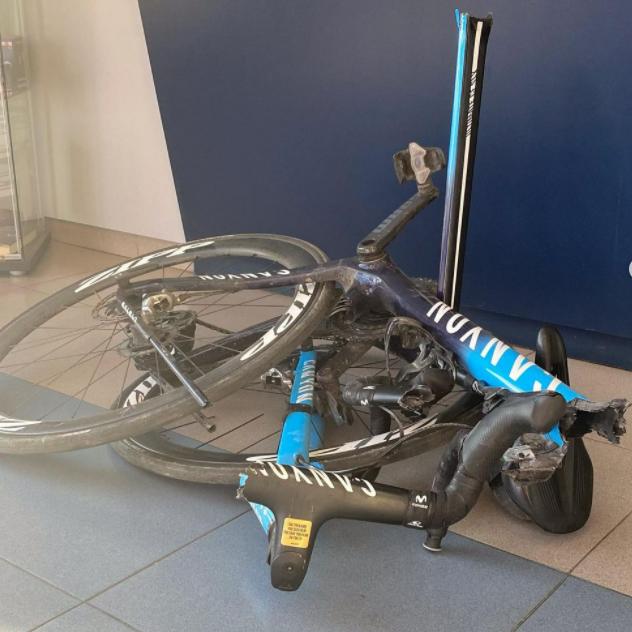 Imogen Cotter's bike after training collision with motorist (credit - Instagram/ Imogen Cotter)
Imogen Cotter's bike after training collision with motorist (credit - Instagram/ Imogen Cotter)16 April 2024, 09:20

Imogen Cotter, Irish champion who was struck head-on by speeding motorist in 2022, announces retirement from professional cycling, revealing that training rides and close passes were leaving her “scared and anxious”
Imogen Cotter, a former Irish road race champion whose professional cycling career was abruptly derailed when a speeding, overtaking motorist struck her head-on while training, has announced her retirement from the sport after revealing that she has cried on the side of the road “on multiple occasions” in the wake of close passes.
Cotter, who signed her first pro contract with UCI Continental squad Plantur-Pura for 2022 after previously representing Movistar’s e-racing team and winning the Irish nationals in October 2021, was training near her new home of Girona in January 2022 when she was hit by the driver, who was overtaking a cyclist on the other side of the road.
Following the collision, after which the 30-year-old said she felt “so lucky to be alive”, Cotter had plates and metal screws inserted into her patella, and plates were also inserted on the outer and inner bones of her forearm. According to Cotter, scans at the time showed that there “was no cartilage left in my right knee”, which also required 40 metal staples to ensure the wound healed.
Last May, she partnered with the Road Safety Authority (RSA) and Škoda Ireland to launch a new road safety campaign urging motorists to “slow down and share the roads safely with people cycling”, noting that many “drivers see cyclists as an object that interferes with their journey”.
After making her comeback on the pro scene that August following months of rehab and recovery, Cotter raced for Fenix-Deceuninck’s development squad – representing the elite team against the likes of Demi Vollering at a handful of races including the Brabantse Pijl and the Giro dell’Emilia – before joining the British outfit Hess Cycling for 2024.
However, last night she announced she was stepping away from the peloton for good after a turbulent few years, revealing that racing and training, along with the constant threat of close passes, were making her anxious and suffering from panic attacks.
“The time has come for me to announce my retirement from professional cycling!” Cotter wrote on social media. “I make this announcement with happiness and peace in my heart. I’ve been so lucky with how understanding and accommodating Hess Cycling have been throughout this process - thank you.
“As this season got underway, I realised that racing was not making me happy anymore, it was making me anxious and scared. Many training rides have ended with me feeling the beginnings of a panic attack, and I’ve found myself crying at the side of the road on multiple occasions after close passes.
“I started to wonder, why was I putting myself through this? I didn’t nearly die two years ago just to spend my days on this planet feeling unhappy. We only have one life. That’s when I knew it was time for a change.
“While I still love cycling and know that it will always be a big part of my life, it has felt near impossible to perform at a level that I can be proud of these last few months. After pushing through setbacks and trauma in the last two years, I am ready to approach cycling, and life, in a calmer way.
“I am proud of a lot of things that I achieved within cycling but the hard work that I have done mentally to make this decision is up there with the best. The fight back from what would have ended most people’s careers comes a close second! Getting my pre-crash power back was something many doubted, yet I did it – and more. I can retire from racing knowing that I am unstoppable – but I choose to stop.”
16 April 2024, 16:18
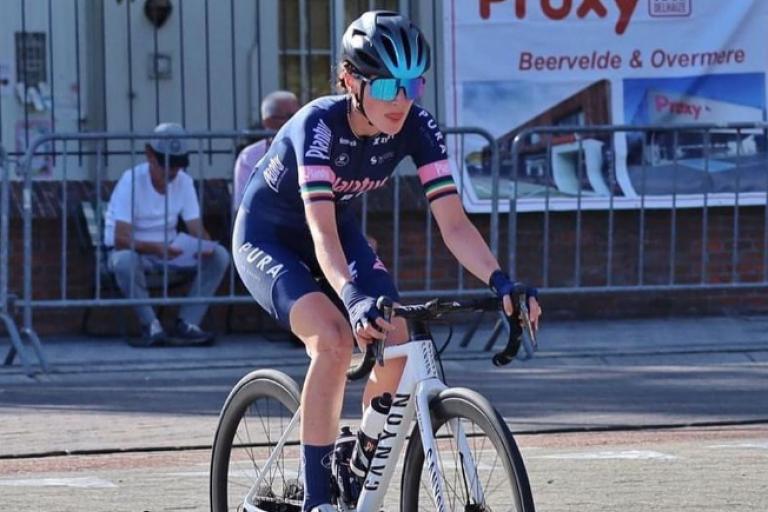
“Issues affecting women in sport – not just elite riders but women who want to get fit or enjoy the freedom of the bike and are afraid to because of car drivers”
The news that former Irish champion Imogen Cotter has decided to retire from professional cycling, citing the ongoing trauma of the head-on collision that left her feeling “lucky to be alive”, has prompted many other cyclists to share their own, similar experiences recovering physically and mentally from a serious crash involving a driver.
Over on Facebook, James said: “Know how she feels. Got hit twice a few months apart. Second time, head one collision where my head smashed the windscreen. Lucky to be alive. Gave up riding on the road and switched to gravel. Not the same, but at least I can get out and spend at least 98 per cent of my rides traffic free.”
“Got hit by a car 14 years ago,” wrote Paddy. “Driver was on the wrong side of the road. Post surgery, have never got back to where I was fitness and milage wise. Still do limited cycling on the road in spite of the fact that driver behaviour has not improved, if anything its deteriorated.
“I’ve noticed over the years fewer and fewer leisure cyclists on the road from the peak of 2008 to 2012. That in itself speaks volumes.”
“Until there are ‘actual’ consequences for bad/poor driving, it will always be a free for all on the roads,” added Mark.
Meanwhile, on Twitter cycling writer Suze Clemitson (also known as Festina Girl) noted that the anxiety caused by dangerous driving presents a harmful barrier, not just to women looking to make it as professional cyclists, but also women who just want to ride their bikes for health and enjoyment:
Issues affecting women in sport - not just elite riders but women who want to get fit or enjoy the freedom of the bike and are afraid to because of car drivers https://t.co/DfCV6nmFwU
— SuzeCY (@festinagirl) April 16, 2024
“Imogen's story is relevant to all of us, cyclists and motorists,” said Carl. “Let’s do all we can to improve our behaviour and how we share the roads.”
16 April 2024, 14:31

Is Zwift’s Big Spin feeding into cyclists’ gambling addictions? Exercise, gambling, and psychology experts divided over potential effects of the “only online sport requiring physical effort to gamble”
Is the Big Spin, the latest game-style event to hit online cycling platform Zwift, feeding into people’s gambling addictions, fostering unhealthy exercise habits, and increasing the risk of burnout, injuries, and anxiety?
That’s the – fairly unusual, I’ll admit – question posed by sometime road.cc contributor Christopher Schwenker, in an article published on his Zommunique website titled: ‘The Zwift Big Spin: The Fitness Phenomenon That’s Sweeping the Metaverse—Should We Worry?’
For those of you who prefer riding your bike outside, or don’t delve too deep into the Zwift world, the Zwift Big Spin is, in the words of the platform’s PR director Chris Snook, a new “fun game-show-style experience where Zwifters are rewarded for every ride they complete”.
Essentially, over the past few weeks, Zwift users have been encouraged to complete rides from four different stages (with two ‘make-up weeks’ currently taking place at the minute).
For each ride you complete, you get to spin the wheel (a digital version of Bruce Forsyth was unavailable), winning “unlocks” such as kit, socks, helmets – all virtual, I should clarify – and, potentially, the grand prize of the ‘Atomic Cruiser’.
“It is the first time we’ve offered Zwifters the chance to collect a host of limited edition unlocks purely based on chance, so it gives Zwifters motivation to return and complete stages more than once,” Snook says.
But as Schwenker notes, lots of people complete the stages a lot more than once. He notes that the top twenty participants spun the Big Wheel over 850 times during the campaign’s first two weeks, with the grand prize going to the user who completed the event almost 70 times.
Meanwhile, over on a Zwift Facebook group, messages such as “I was off work, so I did it all day and got 15 spins”, “I burned 6,000 calories in two days trying to unlock the bike alone,” “It took me sixteen tries in one week to get the Atomic Cruiser”.
This addictive quality has divided experts from the fields of sport and exercise, psychology, and even gambling.
“Intermittent rewards are incredibly addictive and can increase the risk of engagement in unhealthy behaviours,” says Mindful Child and Family Therapy founder Jaclyn Long.
“In the cycling world, riddled with perfectionists and overachievers, offering intermittent rewards might lead to an increased risk of injuries due to overtraining and the emotional toll that increased pressure and resulting anxiety might put on an already-strained system.”
Meanwhile, Psychologist Lisa Macias, who has treated many athletes and addicts, added: “It’s commonly believed that financial reward is a primary motivator for gambling. Interestingly, dopamine (a neurotransmitter that affects the brain’s reward system associated with pleasure, motivation, and mood) release from gambling is related to the unpredictability of the reward.
“Pairing intense physical activity such as biking, which triggers dopamine release with intermittent rewards, may result in excess dopamine. A heightened dopamine reaction to the exercise and gambling stimulus has the potential to create difficulties with impulse control, a driver for addictive, compulsive behaviours.”
Andrew Richardson, a research associate at Newcastle University in Gambling Harms and editor of the International Journal of Esports, says the Zwift Big Spin is the first online sport platform “requiring physical effort to gamble”, and says the event should be monitored to prevent the “out of control pursuit” of rewards.
“First, I am always pleased to see new and unique ways to get more people active. We cannot ignore the physical and mental health benefits of exercising at an individual level or with a community of friends,” he says.
“[However], the organisers could cap the number of bets (rides) a user can place to mitigate the likelihood of harm, promote safe fitness practices, and foster harm reduction principles.”
On the other hand, others have stressed that the addictive qualities of the Big Spin are entirely dependent on an individual’s personality, and that the downsides of the campaign should be balanced with its ability to increase exercise and improve its participants’ health.
“Some riders feel a pressing need to complete events to unlock new items, sometimes at the cost of training and event performance,” says sport and exercise scientist Andy Turner.
“While there are personality types for whom this behaviour can become detrimental, for the majority, the event serves as an excellent means of increasing activity levels and engagement.”
“I love the Big Spin,” adds USA Cycling Esports national champion and USAC Esports committee member Dr Jenn Real.
“The randomness keeps it fun and entertaining and provides extra motivation. It kept me on the trainer when I would usually have stopped because I wanted those darn headphones! I don’t really think there’s anything negative about it. Zwift does a great job of keeping otherwise boring training fun.
“The psychology of random rewards is fascinating, and it explains the massive success of the Big Spin compared to other events where there’s a set unlock.”
What do you think? Is the increasing gamification of indoor training potentially harmful, or is it there simply to make you fitter and healthier?
16 April 2024, 10:55

Promising British pro Anna Shackley “forced to quit top-level sport” due to heart problem, her SD Worx team announces
More unfortunate news has emerged from the women’s side of the sport this morning, as SD Worx-Protime announced that their promising young British rider Anna Shackley has been forced to “quit top-level sport” due to a heart problem first diagnosed in January.
22-year-old Shackley has been regarded by many as one of the most talented and exciting young riders in the women’s peloton, since turning pro with SD Worx in 2021.
(Alex Whitehead/SWpix.com)
After securing overall top tens at the Challenge by La Vuelta and the Tour de Romandie in 2022, last year Shackley bagged a run of highly impressive stage race results, finishing fourth on GC at the UAE Tour, 13th at the Giro Donne, seventh at the Tour de Romandie, and second overall at the Tour de l’Avenir Femmes (where she was sandwiched between fellow U23 stars Shirin van Anrooij and Gaia Realini on the podium).
The Scottish rider also won U23 bronze in front of her home crowds at the Glasgow world road race championships – an experience she described to road.cc as “strange” but “really nice” – and road race silver in the U23s at the European championships in the Netherlands in September.
(Zac Williams/SWpix.com)
However, according to SD Worx, Shackley was diagnosed with cardiac arrhythmia in January, bringing her 2024 season to an abrupt halt.
“Following this, she underwent a heart screening in Maxima Medisch Centrum in Veldhoven in collaboration with the SD Worx-Protime’s medical team. Here, several irregularities were found,” her team said in a statement today.
“That was the reason to immediately take her off the bike and do more extensive tests and procedures at the hospital in Barcelona near her hometown. All this time, Shackley did not train or compete in races.
“The latest result of all the tests and procedures has led to the conclusion that the heart problem is not compatible with a top-level sports career.”
(Alex Whitehead/SWpix.com)
Shackley’s DS at SD Worx, Danny Stam, added: “We are very sorry to see Anna’s cycling career end like this. She was one of the bigger talents in the women’s peloton. We saw in recent years that she was making good progress and we believed she could grow to the world top.
“It is especially unfortunate for her that she is now forced to stop. On the other hand, we are also happy that we were able to prevent any more dangerous complications. We hope Anna can return to her ‘normal’ life and we will work with the team to see how we can help.”
16 April 2024, 15:40
Ah Thérèse, long time, no see… Former health minister claims plan to boost cycling and walking is “anti-driver”
Thérèse Coffey, the Conservative politician who for a brief period during the autumn of 2022 served as health secretary during Liz Truss’ ill-fated stint as prime minister, has lashed out at an active travel project in her Suffolk constituency, claiming that it is “anti-driver”.
Ms Coffey suggested the £5 million of funding for the Woodbridge active travel scheme would be better spent providing cycling proficiency courses at local schools, improving crossing points for pedestrians and cyclists, and repairing road and pavement surfaces.
Read more: > Former health minister Thérèse Coffey claims plan to boost cycling and walking is “anti-driver”
16 April 2024, 15:15
Team GB, inspiring you… to take out a loan?
I think I’ll just leave this – and its myriad possible metaphors – here:
Answers on a postcard.
16 April 2024, 13:52
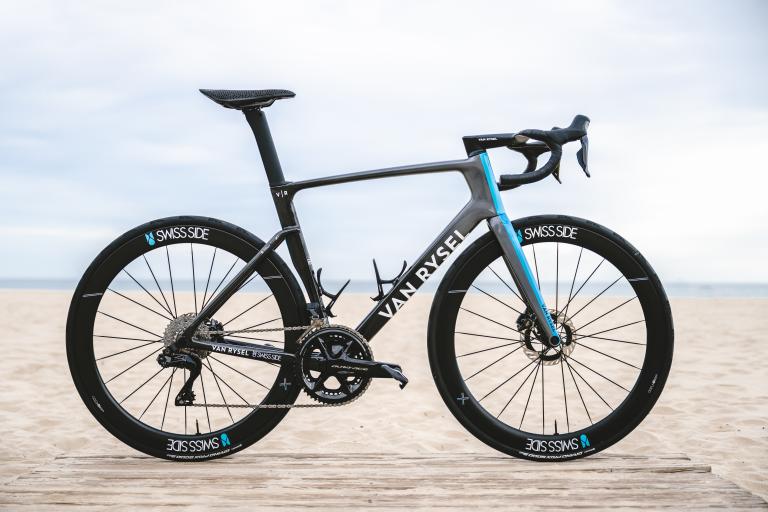
‘And here’s what you could have for £9,000 from Decathlon… Oh, just the one bike then?’
Decathlon may be styling their Van Rysel RCR PRO bike as the most “affordable” WorldTour bike around, but cycling author Simon Warren has raised a valid point about the state of an industry where a £9,000 luxury item can be classified as the ‘cheapest’ anything…
2024.
£9,000 = Affordable.Just me then.
— Simon Warren (@100Climbs) April 16, 2024
Just imagine what else you could come home with if you spent £9k in Decathlon. You'd need an 18 wheeler to get it all home and two lifetimes to use it all.
Bikes are BONKERS expensive.— Simon Warren (@100Climbs) April 16, 2024
Hmmm… What do you think? Have bike prices jumped the shark? Anyway, I’m off to gawp at all those superbikes I’ll never be able to afford. But they’re so shiny…
16 April 2024, 15:56
So, turns out there is a market for ‘affordable’ nine grand bikes after all…
16 April 2024, 13:26
Veteran Italian Alessandro De Marchi wins solo from breakaway at the Tour of the Alps to secure Jayco AlUla’s first victory in two months
17km for the 🥇 what a ride from @ADM_RossodiBuja to finish in glory in Stans @GreenEDGEteam #TouroftheAlps #TotA #LiveUphill pic.twitter.com/biQNrfo9tZ
— Tour of The Alps (@Tourof_TheAlps) April 16, 2024
It was a case of old dog, same tricks at the Tour of the Alps today, as Jayco AlUla’s 37-year-old Italian veteran secured an impressive solo victory in the Austrian village of Stans, the seventh win of his 14-year pro career and his Australian team’s first victory in two months.
The three-time Vuelta stage winner was part of the day-long break that included Bora’s Patrick Gamper, Simon Pellaud of Tudor, and the currently unattached Austrian Lukas Pöstlberger, as the Ineos Grenadiers – controlling things for yesterday’s stage winner and race leader Tobias Foss – led a relatively sleepy peloton behind.
With two kilometres to go on the final climb of Gnadenwald, 17km from the finish, De Marchi dispatched Gamper and Pellaud, before opening up an insurmountable gap on the descent to cruise to the win, over 1.20 ahead of the chasing pair.
Alessandro De Marchi @ADM_RossodiBuja - @GreenEDGEteam goes solo for 17km and wins stage 2 from Salurn/Salorno to Stans
#TouroftheAlps #TotA #LiveUphill pic.twitter.com/w452TesSte
— Tour of The Alps (@Tourof_TheAlps) April 16, 2024
“I was confident. Two years ago, I found a nice environment at Jayco, and it was just about waiting for the right moment and the right time,” De Marchi, who will hope his Alpine escapades secure his slot at the Giro next month – where he will be aiming for a maiden career stage win at his home grand tour – said at the finish.
“With a bit of luck and with a bit of courage, it can happen. When you are almost 38 in this [era of] cycling, a win like this is one of my most important. And at my age, in this cycling, it means a lot.”
16 April 2024, 12:59

“She was an asset to the sport, both on and off the bike and will be a real loss to the peloton”: British Cycling “incredibly sad” to hear of Anna Shackley’s retirement on medical grounds
Coaches and staff members at British Cycling have expressed their sadness at the news that one of the country’s most promising riders, Anna Shackley, has been forced to retire at the age of 22 due to a heart problem.
“Anna has delivered some fantastic results for GB, from junior level and throughout her career and was a real rising star in the British ranks,” Chris Newton, who coached Anna for Team GB, said.
“Anna would always wear the GB kit with pride and was an absolute joy to be around when representing her country. She will be sorely missed by all her teammates and staff at GBCT.”
Stephen Park, the Great Britain Cycling Teram’s Performance Director, added: “We’re incredibly sorry to hear Anna’s news today, she was an asset to the sport, both on and off the bike and will be a real loss to the peloton.
“We have offered Anna our full support now and in the future, and wish her all the best in managing her condition and her next steps. We’re sure she’ll be brilliant at whatever she does next.”
16 April 2024, 12:34
Update: Jonas Vingegaard leaves Basque hospital after 12 days, says “now it’s time to fully recover again”
In news that completely contradicts this morning’s report that Jonas Vingegaard was set for a prolonged stay in a Basque hospital following his horror crash at the region’s home tour, Visma-Lease a Bike have – very timely and helpfully, I may add – confirmed this lunchtime that the two-time Tour de France winner has instead been discharged and will return home to “fully recover” from his injuries.
“Hello everyone, it's time for me to leave the hospital,” Vingegaard is quoted as saying in Visma’s social media post, featuring photos of the sling-wearing Dane standing outside the hospital in Vitoria, where he was treated for a broken collarbone, several broken ribs, a pulmonary contusion, and a collapsed lung following his shocking, high speed crash at the Tour of the Basque Country 12 days ago.
“I want to thank all the medical staff for taking so good care of me. And I want to thank everyone for their moral support. I have received a lot of messages, presents and drawings. Heartwarming! Now it's time to fully recover again. Thumbs up!!”
So much for the doctors’ opinions, eh?
16 April 2024, 11:55
Snatching defeat from the jaws of victory — when cycling celebrations go wrong
In honour of Lorena Wiebes’ hasty, premature celebration at Amstel Gold on Sunday – you could practically hear the Jaws theme as Marianne Vos emerged on her left-hand side – we decided to collate some of cycling’s ‘greatest’ victory salutes gone wrong, when even the best riders in the world (and a few hubristic amateurs) were left red-faced after snatching defeat from the jaws of a victory.
Erik Zabel, look away now…
> Snatching defeat from the jaws of victory — when cycling celebrations go wrong
And the lesson we’ve all learned from that litany of embarrassment? Keep your arms down until you’ve crossed the line, please…
16 April 2024, 11:46
“Who decides the hot topic for this valuable bit of advertising space?”
This latest attempt by a council to make road safety all about people riding bikes and their choice of kit and clothing hasn’t gone down too well with one Dublin cyclist:
Who decides the hot topic for this valuable bit of advertising space? Is 'Cyclists Light Up' really the best option, for April, after clocks changed? How about 'Drivers - Phone Down' or 'Drivers - Get Out Of Bus Lane'? Time to review? @pidge @darragh_mor @carolynmoore_ie pic.twitter.com/4sZmP7agTg
— RobOMhantáin (@mhantain) April 16, 2024
Though, as a few in the road.cc office have noted, ‘Pedestrians, watch out for the massive pole in the middle of the pavement’ might be a decent shout for the council’s next safety message…
16 April 2024, 10:22

Jonas Vingegaard’s Tour de France participation in serious doubt, as doctors think it’s too early to discharge him from Spanish hospital
Doctors treating Jonas Vingegaard at a hospital in Vitoria believe it is too early for the two-time Tour de France winner to travel from Spain to his home in Denmark following his horrific crash at the Tour of the Basque Country two weeks ago.
Vingegaard, who suffered a broken collarbone, several broken ribs, a pulmonary contusion, and a collapsed lung in the shocking high-speed crash, which also saw Remco Evenepoel, Jay Vine, and Stef Cras sustain serious injuries, underwent surgery for his fractured collarbone on Monday, AS reports.
However, despite Visma-Lease a Bike wishing to transfer their grand tour leader home, either to Denmark or his home in Switzerland, as soon as possible, doctors at the hospital have advised against travelling due to the potential complications – particularly concerning Vingegaard’s lungs – that could arise during the journey.
With the length of Vingegaard’s stay in hospital now up in the air, so is the Dane’s attempt to defend his Tour de France title this July, which – especially considering the caution currently being exercised by those treating him – now appears to be something of a forlorn hope.
16 April 2024, 09:58
Italian stage race or the Dakar Rally?
🦅 @INEOSGrenadiers you’re okay?
🇮🇹 #TOTA pic.twitter.com/V50YdhiEh0
— Tour de Tietema (@tourdetietema) April 15, 2024
16 April 2024, 08:41
“WTF”: Ineos Grenadiers release naff AI Tom Pidcock ‘walk out’ concert video – and even Pidcock himself is baffled
Alright, pro cycling teams, I beg of you – please stop trying to latch onto every passing social media trend and creating naff, cringeworthy ‘content’ in the process?
Last year, we had Julian Alaphilippe and his Soudal Quick-Step mates strutting around with torches and water bottles to Celine Dion (apparently, it was a new kit reveal, or something).
Now, to celebrate Tom Pidcock’s superb win at Amstel Gold on Sunday (only the struggling British team’s second WorldTour victory of the season), the Ineos Grenadiers’ social media team thought it would be ‘cool’ to insert their star all-rounder into the latest AI-generated social media craze:
No, that tiny sip of Amstel non-alcoholic beer didn’t go to the young lad’s head.
Apparently, that’s an AI-generated version of Pidcock performing rapper Lil Yachty’s ‘legendary’ walkout at the 2022 Summer Smash festival (no, I haven’t heard of any of those things either).
While some loved the Instagram video – commenting with impenetrable Gen Z phrases like ‘Who let admin cook?’ (I really don’t know) – it turns out that Pidders himself was a bit baffled by the whole thing, replying to the video with a simple but effective “WTF”.
I’m with you, Tom.
16 April 2024, 08:07

Triathlete drops five bottles in a row during botched feed zone – but still manages to win race
Next time, either at the Tour of the Alps today or tomorrow’s Flèche Wallonne, you see a peloton of 180 or so riders streaming through a feed zone, take a moment to reflect on how expertly (most) pro cyclists navigate the organised chaos of grabbing bottles and mussettes from the outstretched hands of nonchalant swannies at the side of the road.
Because, as Dutch triathlete Youri Keulen proved during the bike section of the Singapore T100 triathlon at the weekend, grabbing bottles at speed ain’t easy:
🤦
New rules for bottle handovers are leading to a few slapstick moments at the Singapore T100 💧 @t100triathlon pic.twitter.com/3zfBxTyAb5
— Eurosport (@eurosport) April 14, 2024
Five bottles in a row? Were they covered in butter?
Anyway, despite his feed station faux pas – I can hear Carlton Kirby utter the word ‘sustenance’ as I type – Keulen held on to his lead to secure his maiden T100 World Tour victory, along with his place in internet infamy.
His slippery fingers weren’t alone in Singapore, however, with Chelsea Sodaro experiencing her own feed zone problems in the women’s race – though, unlike Youri, at least Sodaro was able to grab that elusive fifth bottle…
Perhaps the triathletes could borrow a page from the cycling feed zone handbook and grab their bottles from the right-hand side of the road next time? Just a thought…
After obtaining a PhD, lecturing, and hosting a history podcast at Queen’s University Belfast, Ryan joined road.cc in December 2021 and since then has kept the site’s readers and listeners informed and enthralled (well at least occasionally) on news, the live blog, and the road.cc Podcast. After boarding a wrong bus at the world championships and ruining a good pair of jeans at the cyclocross, he now serves as road.cc’s senior news writer. Before his foray into cycling journalism, he wallowed in the equally pitiless world of academia, where he wrote a book about Victorian politics and droned on about cycling and bikes to classes of bored students (while taking every chance he could get to talk about cycling in print or on the radio). He can be found riding his bike very slowly around the narrow, scenic country lanes of Co. Down.
Latest Comments
- Mr Blackbird 42 min 10 sec ago
The problem with using a mobile is the image would be quite small and there would be a delay in recognising a hazard. The camera technology needs...
- mctrials23 45 min 18 sec ago
Amazed she wasn't given a gentler slap on the wrist. Ireland is fantastically poor at taking dangerous driving seriously.
- cmedred 45 min 21 sec ago
"Be Safe in Low Light Conditions?'' Really? Where's the evidence for that? "Be Safer in Low Light Conditions'' might have been better. Hi-Vis,...
- chrisonabike 1 hour 45 min ago
Indeed - but again these are perhaps questions we should keep asking. Even if the immediate answer is "well we are where we are" or "how on earth...
- Surreyrider 2 hours 38 min ago
Specialized aren't that American. Merida owns something like 49%.
- wtjs 3 hours 32 min ago
Then smash bad driving behaviour very hard...
- David9694 8 hours 10 min ago
Calls for Oxfordshire transport chief to resign blocked...









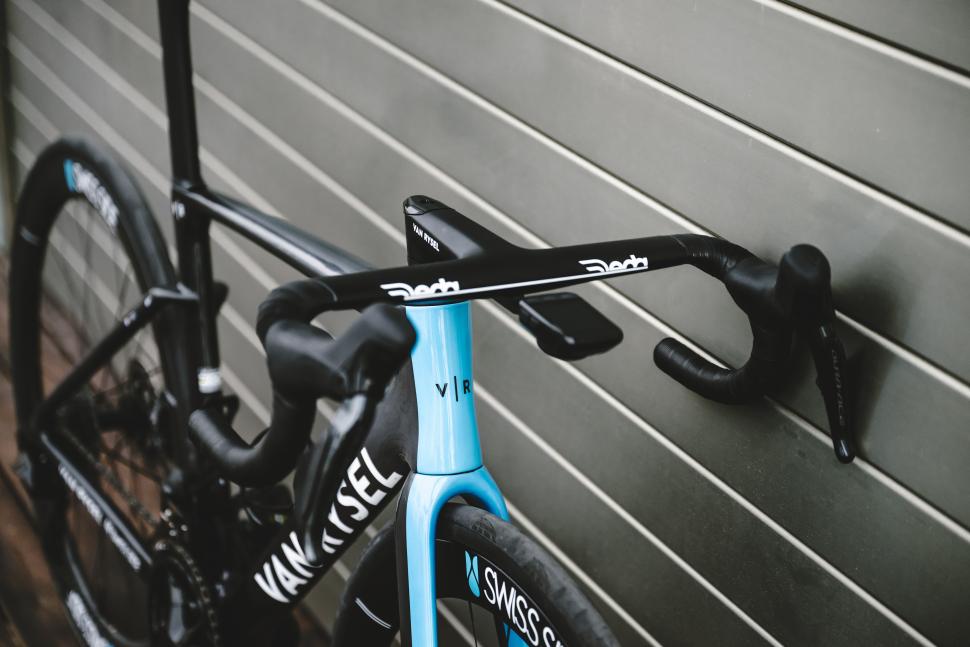
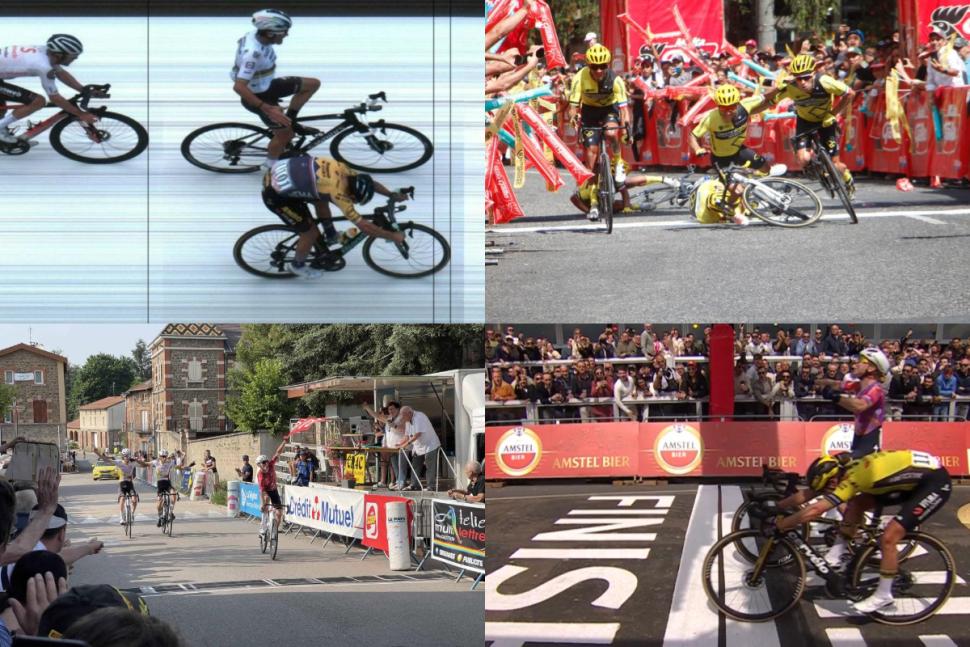
Add new comment
21 comments
The Imogen Cotter story is the most graphic illustration of what car domination and our driver-centric society can do. If a professional cries at the side of the road after close passes, imagine what a novice feels like: they'll get off the bike and never ride again.
Could we get Therese Coffey on a bike?
Helmet wars !
video - https://twitter.com/AmericanFietser/status/1780278529109705012
An end of season used pro bike for £1500 is affordable, just choose the rider carefully.
Well done to the Yorkshireman on his Amstel effort, a true lightweight mixing it with the big boys. It's also got to be a bit of a head scratcher for the lack of success of Ineos though, not good to see the British team failing, where did the magic go?
Another person looking at a pro level bike and going "that's crazy expensive, cycling is out of control" who needs to price up a moto GP bike and use that to decide if motorbikes are out of control (ballpark £4-5 million) or an F1 car as that's a reasonable comparison.
There is no reason for a recreational cyclist to ride the same kit as the pros. If you do want the same kit as the pros its incredibly affordable compared to most sports.
Gutted to read the news about Anna Shackley, a very talented young rider with alot more to come.
As she was from just along the road from me, it was great watching her grow up through the sport.
I wish her all the very best for the future, your cycling exploits will be missed.
Likewise. Perhaps she can switch sports to something more compatible with her condition.
The only positive about the story is I'm in the second photograph of her climbing Montrose Street - road.cc 'fame' at last!
Is it me or is it a bit weird to have everyone comment but the lady herself?
I hope she approved the Team and BC comments.
The BBC quoted her:
Triathletes proving once again that there's more to riding a bike than just watts, FTP, w/kg.....
Musette? Although this "hoopla"-style handover is probably not now recommended?
In defence of the triathletes (full disclosure: I was a racing cyclist (mostly TTs) and switched over to long course triathlon for a while before switching back to cycling), they're not taking bottles from a familiar team staffer, they're taking them from unpaid volunteers with little or no training. I never dropped a bottle during a '100' or '12' when my mate was handing them up, but missed a few whilst riding at a terrified volunteer at speed.
It doesn't help of course that TT bikes don't handle like road bikes, and long course triathletes have no natural reason to develop bike handling skills - which is a kind way of saying most of them don't have any. Before taking the Michael too much, take a look at how fast he ran 18km off the bike in the heat and humidity of Singapore ...
And ended the race in the medical tent on oxygen and in an ice bath as he was suffering severe heat stroke.
I've seen pro tour riders do just the same, there is a technique to it that both the rider and bottle giver should follow for success.
Is the skill not being too special!
My mum who is 70+ and has a replacement hip is able to hand me up bottles whilst holding my 4 month old puppy, albeit in MTB races so a bit slower, but she's done it in the past on downhills in gravel races just fine. Poor triathlete riding skills like normal.
So ... it's just practice. If the bottle giver just holds the bottle still and has their hand out of the way, all is good.
The volunteers at IM events (often children) flinch at the last second - not unreasonable if you're not used to someone riding that fast that close to you and the bottle moves just enough that you drop it. 750g at arm's length at 40km/h isn't trivial. The pro cyclists take the bottle much closer because both parties are more confident in the other.
I need an ice bath in Singapore after walking from the hotel to the office!
like I say, the volunteers have no practice and the athletes have to take a bottle a handful of races a year. Our boy above was previously a short course guy so never had to do it at all before.
I still can't understand what happened here though (ladies in Hyde Park in 2010):
https://www.youtube.com/watch?v=NRKajY5GlyI
In a TT with poor bike handlers/inexperienced bottle handers, would it not be possible to have the bottle placed on an appropriate-height structure - I'm thinking the tray on a workstand might work well, and all cyclists will own one - so the rider can see from a long way off where their bottle is and it would remain stationary so they could just pick it off as they passed?
Except that a human being is at least theoretically better at stepping out of the way when something goes wrong.
they do that in the running part and marathons, seem to end up wearing more of the water than drinking it, which may be the point in high humidty climates, but theres a knack to the handover thats just about practicing it.
Can't they just use those "sticky bottles" I keep reading about?